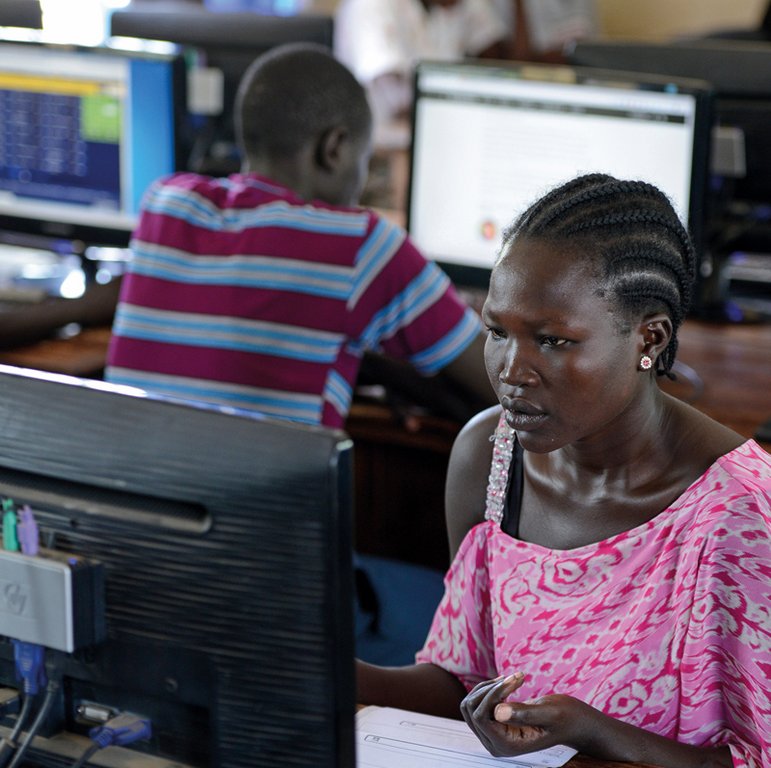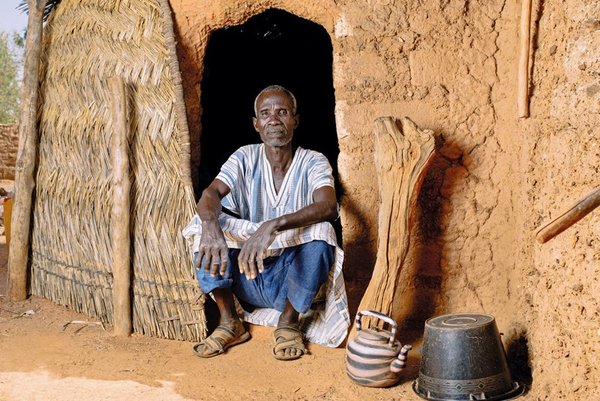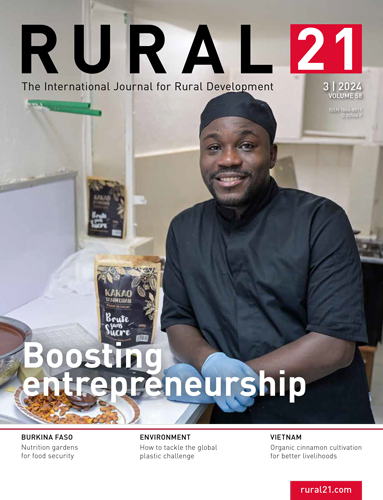 Download this article in magazine layout
Download this article in magazine layout
- Share this article
- Subscribe to our newsletter
Incentivising African youth for agriculture and agribusiness
Africa’s agriculture sector figures strongly in the continent’s gross domestic product, accounting for over a quarter of it. In addition to the sector’s significant contribution to foreign exchange, over 60 per cent of the African labour force are employed in agriculture, according to an African Development Bank estimate. More than 80 per cent of this population group are smallholder male and female farmers who contribute about 80 per cent of the continent’s food production and food security.
Yet the African farmer population is dominated by aging farmers, posing a challenge to the already vulnerable and fragile agricultural systems that are sustained by poor smallholder farmers. For instance, in Ghana, the average age of farmers is about 54 years. Without doubt, the aging farmer population on the continent is a serious developmental challenge that requires urgent policy attention. While aging farmers possess requisite agroecological knowledge and skills that can contribute to the sustainable management of climate change, environmental and other related challenges confronting agriculture, they are not in a position to productively manage their farms and contribute substantially to robust agricultural transformation and productivity.
Agribusiness as a game changer
In comparison with other parts of the world, Africa would have to more than double its current agricultural productivity by 2050 to meet population growth, tackle food insecurity and nutrition-related challenges and advance its socioeconomic development. Evidently, the aging farmers cannot sustain the growth needed in the agricultural sector. The solution lies in the active and mass participation of African youths, who constitute the largest population on the continent. However, while many of them are either unemployed or underemployed, the majority have little to no interest in engaging in agriculture, partly due to poor public perception and narratives ascribed to agriculture, agricultural systems relying on drudgery and poor socioeconomic standards of farmers engaged in the sector.
The insights shared in this article are based on self-funded research that explored the influence of diverse factors, including subjective and objective agricultural knowledge, incentives, climate change experience/emotions and 21st century skills, on youth participation in agribusiness in Ghana. The study comprised 520 youths between the ages of 15 and 35 years, as defined in the Ghana National Youth Policy, and selected across the country's 16 regions. About 60 per cent and 40 per cent of the participants are males and females, respectively, while the rural-urban distribution of participants is 70 per cent urban and 30 per cent rural. This disparity is due to the data collection approach, where an online survey using the Kobo Toolbox, an open access data collection, management and visualisation platform, was applied. In terms of education, all respondents have at least basic education, with the majority of them having tertiary education, depicting the high proportion of educated youth active online in Ghana.
The preliminary results show that there is a gradual shift in the perceptions ascribed by youth to agriculture, especially when examined from an agribusiness perspective and not from that of the conventional farming system based on hard manual labour. Many studies show that young people perceive agriculture as a poor man’s business. Consistent with this narrative, when asked whether they would enter into agriculture, the majority of the 520 respondents indicated they would not. However, responding to whether they would enter into agriculture and agribusiness as a profession, the majority of the participants were affirmative. Implicitly, many youths perceive conventional agriculture as not a profession they would take up.
Nevertheless, agribusiness, which spans the agriculture value chain (production, transport and distribution, processing, advisory services, etc.), seems attractive to youth partly thanks to the application of technology and the business-oriented nature of agribusiness, coupled with success stories from youth engaged in agribusiness across Africa. This is not surprising, as projections show that the agribusiness sector in Africa will be worth one trillion US dollars by 2030. Yet, achieving and boosting the actual participation of youth in agriculture and agribusiness requires effective and efficient support systems.
From access to resources to market opportunities
Multiple incentives are needed to significantly boost youth participation in Africa’s agriculture and agribusiness sector. Primarily, land is an essential resource for agriculture and agribusiness. In comparison with other regions of the world, Africa has a relatively large proportion of arable land. Yet the continent’s agricultural productivity is one of the lowest in the world, partly because of suboptimal and ineffective land management practices. Coupled with this, the patriarchal system of African societies disproportionately excludes women and youth from owning and accessing land.
For youth who envision to participate in agriculture and agribusiness, addressing the challenges associated with land ownership and access can be instrumental in enhancing their participation. State policies should be geared towards increasing access to land for such youths. This includes interventions such as minimising the cost and time associated with land acquisition and establishing some formal tenancy systems. In addition to land ownership and access, it is essential for government policies to increase youth access to improved seeds through a robust value chain, and in partnership with the private sector.
Without doubt, agriculture and agribusiness is capital-intensive, and shifting from conventional agriculture to high productive and transformative farming systems requires enormous funds, which youth have limited access to. Creating special banks dedicated to funding youth agripreneurship is crucial in tackling the existing financial challenges and boosting youth participation in the sector. Similarly, reducing high interest rates associated with existing banks that provide funding for agriculture and agribusiness is strongly recommended. There should be a deliberate attempt by state institutions and governments to prioritise connecting youth agripreneurship to the private sector, international development agencies and funding institutions that have portfolios in funding agriculture activities in the Global South.
Apart from increasing youth access to funds, it is equally essential to build their capacity in efficient and effective financial management systems. The dedicated banks for youth agripreneurship should be assigned this responsibility to ensure that young agripreneurs have requisite financial management skills. Achieving this calls for strong collaboration with high-performing institutions that offer capacity building training in areas of financial management, leadership, business management, negotiation and communication among others. Only in this manner can young agripreneurs be strategically positioned to increase the productivity and profitability of their business.
Given the vulnerability of African agriculture systems, it is imperative for governments to increase both the development and the application of technologies necessary to boost youth participation. Technologies for efficient farm and resource management, post-harvest management, product preservation and value addition, trade and market facilitation, among others, are crucial for sustaining and promoting transformative agriculture and agribusiness on the continent. Infrastructural investment in terms of mobility and warehousing is equally important to facilitate effective and efficient agriculture and agribusiness ecosystems. Rural communities must be connected to market opportunities. In addition to making technologies and other infrastructure available and accessible for agripreneurship, deliberate efforts are needed to establish industrial free zones dedicated to youth agripreneurship.

The 21th century competency skills are crucial to the successful transformation of any sector.
Photo: Jörg Böthling
Academic programmes have to be reformed
Reforming academic programmes focusing on agriculture and agribusiness across different levels of the African education system can potentially enhance the acquisition of relevant skills and knowledge needed to position youth strategically in the sector. The 21st century competency skills (numeracy, communication, critical thinking, creativity, networking, leadership, information technology, etc.) are high priorities for the successful transformation of any sector. Educational institutions should reposition themselves and their programmes to ensure that youth acquire these relevant skills for the world of work and business management. Establishing strong collaborations with the private sector, where young people can have opportunities to acquire such skills in a real-world scenario, is highly recommended.
The foregoing discussion shows that boosting youth participation in agriculture and agribusiness requires huge investments. The benefits of such investments can immensely contribute towards addressing development-related challenges such as youth unemployment, poverty, food insecurity and economic growth that confront the African continent. With progressive and incremental planning and implementation undergirded by strong political will, Africa’s agriculture and agribusiness ecosystem can be transformed to achieve these benefits. Strong public-private partnerships together with support from international development partners are equally recommended for the realisation of a transformative agriculture and agribusiness sector in Africa.
Peter Asare-Nuamah holds a PhD in Governance and Regional Integration with specialisation in environment, climate change and agriculture, and is currently a Senior Researcher at the Center for Development Research (ZEF), University of Bonn in Germany. He works as a social learning and (gender-responsive) theory of change expert on the INTERFACES project under the German Federal Ministry of Education and Research (BMBF)-funded project on Sustainable Land Management in Africa.
Contact: pasarenu@uni-bonn.de




Add a comment
Be the First to Comment